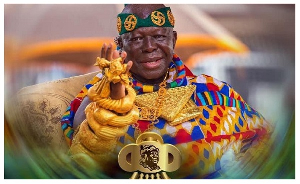Opinions of Sunday, 13 November 2016
Columnist: Kwarteng, Francis
Anton Wilhelm Amo, Ghana’s Greatest Philosophical Genius 2
“Anton Wilhelm Amo's most devoted researcher and biographer, the East German scholar Burchard Brentjes, writes in his generally excellent 1977 study, “Anton Wilhelm Amo: Der Schwarze Philosoph in Halle,” that were it not for the peculiarities of Amo's life and identity, there would be little reason to study his work…
“At the same time, I had been interested for a while in the intellectual context of philosophy at the University of Halle in the first half of the 18th century. I had been working for some years on a critical edition and translation (with François Duchesneau) of G. W. Leibniz's 1709-10 controversy with the Halle Pietist physician, Georg Ernst Stahl. I had heard that Amo's 1734 work, “De Humanae Mentis Apatheia,” was a later echo of the same controversy that set Leibniz and Stahl against one another, and this for me was a sufficient reason to have a look at it.
“I was amazed to find myself, as I first began reading it, often getting confused as to whether I was reading a 1734 academic dissertation of an anti-Stahlian student at Halle, or whether I was looking at Leibniz's own, earlier objections to Stahl! Amo's work gave me a sudden, vivid window into the intellectual legacy of the Leibniz-Stahl debate, and into what life as a philosopher at Halle in the 1730s—forced to choose between conservative Pietism and a supposedly subversive variety of derivative Leibnizianism best represented in the work of Christian Wolff—must have been like…
“My earlier bias as a historian of philosophy, in favor of originality, missed the important truth that minor or derivative thinkers can often reveal to us a good deal of what was at stake in a historical debate. Amo is helping me to learn about Leibniz and Stahl, retroactively, as it were. What's more, I have no evidence that his work is derivative or unoriginal. His standing up against the Pietist view of the relationship between mind and body, as far as I can tell, is based on sound and rigorous reasoning, and also seems to have been a position that required a certain amount of moral courage to adopt (after all, it was ultimately Amo's defense of Leibnizian-Wolffianism that was to blame for his bad fortune in Germany).
“And beyond these concerns about justification that emerge only within the rather narrow field of academic history of philosophy, there is of course the man, Amo, whose legacy deserves to be made known. As was argued as early as Abbé Grégoire's 1808 abolitionist survey, “De la littérature des Nègres,” the very existence of Amo and his life's work is a strong testament against racism, and against the rather simplistic idea that the history of Western philosophy has always been a history of exclusion” (Kenan Malik, Indian-born English neurobiologist, historian of science, lecturer, and writer. Kenan has given lectures at the University of London, Cambridge, Oxford, the London-based Institute of Historical research among others).
SPECIAL NOTES
See William Abraham’s essay “The Life and Times of Anton-Wilhelm Amo” (“Transactions of the Historical Society of Ghana,” Vol. 7, 1964), and also Norbert Lochner’s “Anton-Wilhelm Amo” in “Transactions of the Historical Society of Ghana” (Vol. 3, 1958).
For our readers’ information, Appiah mentions Amo’s critique of philosophical work done by mathematician Rene Descartes (see world-famous neuroscientist, philosopher and psychologist Antonio Damasio’s work “Descartes Error: Emotion, Reason, and the Human Brain” and “Looking for Spinoza: Joy, Sorrow, and the Feeling Brain). We have discussed both men (Descartes and Damasio) in some of our articles and will not belabor them here.
What we can say is that, finally, Descartes, the Father of Modern Philosophy and the Father of Analytic Geometry, was a towering figure in Western thought. His book “Meditations on First Philosophy” is a standard text in most philosophy departments around the world, especially in the West. We owe the Cartesian coordinate system and modern rationalist epistemology to him. We hope this little information provides some background to the intellectual or philosophical “conflict” between the works of Amo and of Descartes.
In sum, Descartes was a towering figure in Western mathematics and philosophy (see “Descartes Secret Notebook: A True Tale of Mathematics, Mystics, and the Quest to Understand the Universe”).
CONTINUATION OF KWAME ANTHONY APPIAH’S REITH LECTURE
So I have said that Amo’s education was an experiment. What hypothesis was it designed to test?
When the Rector of Wittenberg complemented Dr. Amo on his successful defense of his dissertation, he began by talking about his African background. He mentioned some of the most famous African writers from Antiquity, including the Roman playwright Terence, Tertullian and St. Augustine among the Christian Fathers, and he discussed the Moors who conquered Spain from Africa…
So our dukes were presumably interested in a question not about Africans in general but about black people, about Negroes, about the Moor. But what could you learn from a single experiment with one black man? Did Anton Ulrich and his friends conclude that any black child, taken at random and given Amo’s education, would have ended up as a professor of philosophy?
And if Amo had not passed the exams, would they have concluded that this somehow showed something about every black person?
Three centuries later, we are bound to see Amo’s story through the prism of race. Not so in his day. Then, everyone agreed there is what I called “peoples” in the last lecture, which was about nationalism; that is to say groups of human beings defined by shared ancestry, real or imagined, as there had been since the beginnings of recorded history.
When Leibniz wrote about—that’s the librarian at the place where Amo was educated–when Leibniz wrote what distinguished one people from another, he thought what mattered was language…
But the idea that each people shared an inherited biological nature was not yet the consensus of European thinkers. For one thing, most of them believed in the Biblical story of creation, and that meant that every living person was a descendant of Adam and Eve, and each was also a descendant of Noah.
For another, the idea of distinguishing between our biological and our non-biological features was still in the intellectual future.
When Leibniz wrote about—that’s the librarian at the place where Amo was educated—when Leibniz wrote what distinguished one people from another, he thought what mattered was language.
And if you read contemporaneous accounts given by European travelers and the thinkers who read them, the great debates at that time were about the role of climate and geography in shaping color and customs, not about inherited characteristics.
Indeed, the very word “biology” wasn’t invented until about 1800. Until then, the discussions took place under the heading of Natural History.
And it’s only with the Swedish naturalist, Carl Linnaeus, who was Amo’s contemporary, that scholars began to think of human beings as part of nature in a way that meant that we could be classified, like other animals and plants, by genus and species.
And it was Linnaeus who first called us Homo sapiens, and who placed us alongside monkeys and apes in the natural order….
There were, however, notable forces of opposition. The Abbé Grégoire, the great French revolutionary Catholic priest and anti-slavery campaigner, published a survey of the cultural achievements of black people in 1808, less than two decades after the storming of the Bastille.
He subtitled it, “researches on their intellectual faculties, their moral qualities and their literature,” and he offered up Amo, among others, as evidence for the unity of the human race and the fundamental equality of black people.
He sent a copy of this book to Thomas Jefferson, who had remarked in his “Notes on the State of Virginia” that he could never “find that a black had uttered a thought above the level of plain narration.” Grégoire, with Amo in hand, urged him to think again.
Yet what did Amo’s example demonstrate? No one ever thought that because Plato or Descartes was a European, every European was capable of works of philosophical genius.
Amo’s relevance in Grégoire’s argument derived largely from the fact that, for black people, the racial essence was thought by many to rule out real intellectual capacity.
Hence Kant’s rather foolish remark that a black man could only say stupid things. Amo’s existence did refute that view. Still, skeptics could insist that Amo was just an exception…
So Grégoire not only assembled a dozen such counterexamples in his book, but he reported on visiting a group of black children brought from Sierra Leone to a school founded by William Wilberforce in Clapham, and concluded that, so far as he could tell, “there exists no difference between them and Europeans except that of color.”
You couldn’t tell much about what black people were capable of by seeing what most of them achieved in the appalling conditions of New World slavery, Grégoire.
As the freedwoman Harriet Jacobs put it somewhat genteelly later, there was reason to excuse enslaved people some “deficiencies in consideration of circumstances.”
Who knew what would happen if all black people were offered the education of Anton Wilhelm Amo?
As Grégoire’s activism suggests, the background to the debate about the capacity of the Negro was the explosion of African slavery in Europe’s New World colonies in the Americas.
In Amo’s years in Germany, the trans-Atlantic slave trade was rising to its mid-eighteenth-century peak, when nearly 200,000 people a year were transported in shackles from Africa to the New World.
Many historians have concluded that one reason for the increasingly negative view of the Negro through the later eighteenth century was the need to salve the consciences of those who trafficked in and exploited men and women.
As Grégoire put it, bleakly but bluntly, “People have slandered Negroes, first in order to get the right to enslave them, and then to justify themselves for having enslaved them …”
It is, perhaps, worth insisting that even if you could show that every single Negro wasn’t much good at philosophy, it would not have justified black slavery.
As Thomas Jefferson said, in responding to the Abbé Grégoire, “Because Sir Isaac Newton was superior to others in understanding; he was not therefore the lord of the person or property of others.”
The slanders against the Negro race may have salved some Christian consciences: they could never have justified what had been done in enslaving millions of black people.
GUESTIONS AND ANSWERS AFTER APPIAH’S PRESENTATION
SUE LAWLEY: “But just answer my point about the progression, the progress actually.”
KWAME ANTHONY APPIAH: “…So it’s possible for a black kid from Axim to come and be a professor of philosophy and get a PhD and teach and be leading processions, student processions, and being turned down by girls who he is attracted to…”
ATUKWE OKAI: “It is an honour and a privilege to listen to Professor Appiah, considered the most cultured man in America. And a proud son of Ghana and Africa. Anton Wilhelm Amo. We learnt about some ten years ago or more that Professor…”
“KWAME ANTHONY APPIAH: “Willie Abraham.”
ATUKWE OKAI: “William Abraham.”
KWAME ANTHONY APPIAH: “Yeah.”
ATUKWE OKAI: “…Was working on research about him, working on a book. Are you in a position to say how far he got with it?”
KWAME ANTHONY APPIAH: “I’m not, but I will say that I mean obviously for those of us who do philosophy with a West African or even more specifically a Ghanaian connection, the discovery that there was somebody at the heart of the European Enlightenment—a little boy who played in the library where Leibniz was librarian—has been a source of excitement all along.
And Professor Abraham was the first person I think to draw our attention to this, but since then other philosophers, including other Ghanaian philosophers, including Kwasi Wiredu, for example, have written about him and we know more about him than we did when Professor Abraham first started talking about him.”
KWAME ANTHONY APPIAH: “Well it’s a very good question why he disappeared essentially between the Abbe Grégoire in the early nineteenth century and the late part of the…the second half of the 20th century, and I think that part of it is that that was a period in which the idea of the African intellectual, the African thinker who could sort of spar with Descartes was not comfortable for an awful lot of people because they had the view that that wasn’t…they had the racial fixation; they thought that what you could do in these dimensions and domains had to do with your race and so he was a sort of standing counterexample.
I should say another reason is that some of his work has disappeared. The most depressing thing, I think, is that he was the first person, so far as I can tell, of African descent to write about the law of slavery, and unfortunately we don’t have that thesis. We do have some of his other work. We don’t have that.
It would be fascinating to see what someone in his circumstances thought in a philosophical way about the basis of enslavement since he came from the Dutch West India Company to Europe. And even if he wasn’t enslaved, for example his brother was. His brother ended up as a slave in Suriname.”
We shall return with Part 3, the concluding section.
REFERENCES
Amo, Anton Wilhelm (1703?-1753). Retrieved from http://www.blackpast.org/gah/amo-anton-wilhelm-1703-1753
For transcript presentation, go to http://www.bbc.co.uk/programmes/b00729d9/episodes/player
See also http://downloads.bbc.co.uk/radio4/transcripts/reith3_colour.pdf
Anton Wilhelm Amo. “An African Philosopher in the German Enlightenment.” Retrieved from http://www.theamoproject.org/
“Philosopher in European Universities.” In: Current Anthropology. A world journal of the sciences of man (1975), Vol. 16, No.5, S. 443-444.













